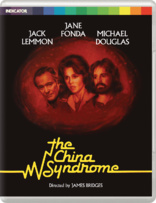The China Syndrome Blu-ray Movie
HomeThe China Syndrome Blu-ray Movie 
Indicator Series | Limited EditionPowerhouse Films | 1979 | 122 min | Rated BBFC: PG | Jun 25, 2018
Movie rating
7.5 | / 10 |
Blu-ray rating
| Users | 0.0 | |
| Reviewer | 4.0 | |
| Overall | 4.0 |
Overview
The China Syndrome (1979)
While doing a report on energy sources, ambitious reporter Kimberly Wells witnesses a near-accident at a nuclear power plant. Attempting to publicize the incident, Wells soon finds herself entangled in an inquiry by a senior engineer at the plant into possible faults that the power company refuses to acknowledge.
Starring: Jane Fonda, Jack Lemmon, Michael Douglas, Scott Brady, James HamptonDirector: James Bridges
| Thriller | Uncertain |
| Drama | Uncertain |
Specifications
Video
Video codec: MPEG-4 AVC
Video resolution: 1080p
Aspect ratio: 1.85:1
Original aspect ratio: 1.85:1
Audio
English: LPCM Mono (48kHz, 24-bit)
English: DTS-HD Master Audio 5.1 (48kHz, 24-bit)
BDInfo
Subtitles
English SDH
Discs
Blu-ray Disc
Single disc (1 BD)
Playback
Region free
Review
Rating summary
| Movie | 3.0 | |
| Video | 4.0 | |
| Audio | 5.0 | |
| Extras | 4.0 | |
| Overall | 4.0 |
The China Syndrome Blu-ray Movie Review
Reviewed by Dr. Svet Atanasov September 6, 2018James Bridges' "The China Syndrome" (1979) arrives on Blu-ray courtesy of Indicator/Powerhouse Films. The supplemental features on the disc include an original trailer for the film; recorded Q&A session with Jack Lemmon; archival featurettes; and more. The release also arrives with an exclusive booklet with a new essay by Neil Sinyard, an overview of contemporary critical responses and historic articles on the film. In English, with optional English SDH subtitles for the main feature. Region-Free.
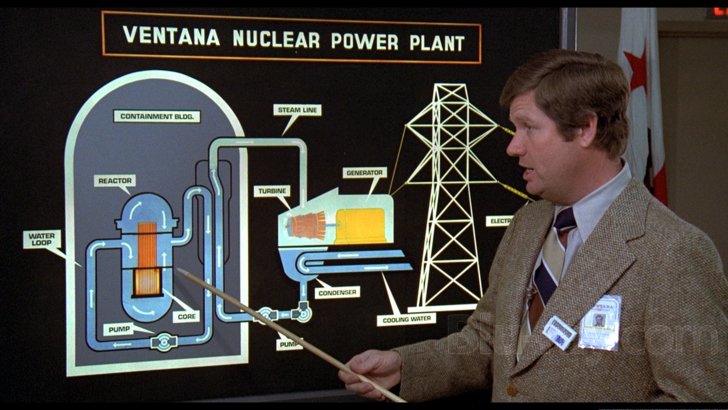
There are two good lessons in this film. The first is delivered through a chilling scenario that so far America has been lucky to avoid. But not Japan. Just a few years ago, the Fukushima disaster proved that even in the modern era, nuclear power plants can never be as safe as they ought to be to justify their existence. Simply put, there are too many external factors that can abruptly destabilize them beyond the point where they can remain manageable. In other words, nuclear power plants are still ticking bombs that can go off at any time. The second lesson is a bit more subtle, and it emerges during the second half of the film. It is about integrity and trusting the people in the news business, whose job is to always report the truth. It is actually a pretty simple lesson but, sadly, it has a greater relevance today than it did nearly forty years ago.
The events in the film take place in Southern California, but the location just as easily could have been a provincial area somewhere in the Heartland. A TV reporter (Jane Fonda) and her crew travel to a fully-functional nuclear power plant and while doing a special there they experience an emergency situation that nearly unleashes Armageddon. The cameraman (Michael Douglas) secretly tapes the panic in the control room and later on, after the crew’s suspicion that the situation was as serious as it appeared is confirmed, a decision is made to use it in a bombshell report. However, almost immediately the reporter is warned to abandon the story, first by her boss at the TV station and then by proxies directed by the owners of the plant. Meanwhile, the main operator (Jack Lemmon) from the control room reconsiders his stance and decides to assist her, and by doing so instantly becomes a target for his bosses. In the ensuing chaos, a lot of desperate plays are made to expose and hide the truth about the plant’s ability to operate as designed and approved by the local authorities.
The first half of the film is vastly superior. Director James Bridges effortlessly builds the tension and at the same time makes it very easy to understand just how quickly a seemingly ordinary situation can become critical. (While technology has obviously improved dramatically over the years and modern nuclear power plants have much more sophisticated safeguarding models in place, the risk of a malfunction that disables them either partially or completely undoubtedly remains). The quick events that lead to the initial confrontation between the news crew and the business group that operates the plant also look credible. However, Lemmon’s character transformation also effectively changes the film’s identity and all of the thought-provoking material from the first half is pushed back in favor of a wide range of familiar Hollywood clichés about morality and corporate America that seriously hurt the integrity of virtually everyone that has something important to say about the crisis at the plant. A decent dose of straightforward action then prepares an entirely predictable finale.
What partially redeems the second half is the legit warning that the media is neither as free as it is perceived to be nor as objective as it should be. There is a very good segment there in which the raw material from the control room is discussed, and it quickly becomes clear that the top priority of the decision makers at the network is the response to the crisis that even more powerful people will have elsewhere, not to disclose to the public the sobering information that they have acquired. So the lesson here is that in the news business there is factual news and ‘right’ news, and the factual news may not always reach the public.
The China Syndrome Blu-ray Movie, Video Quality 
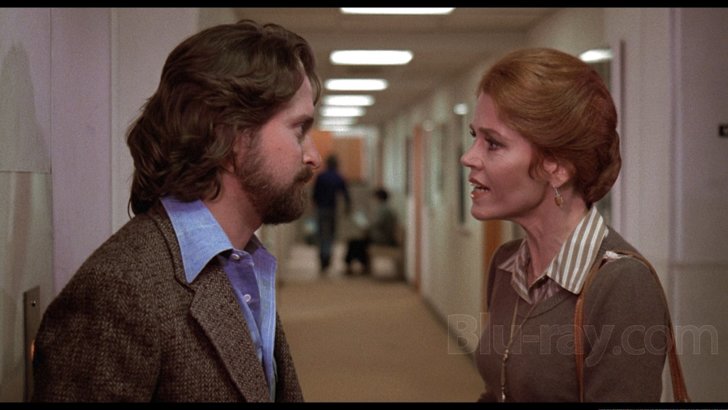
Presented in an aspect ratio of 1.85:1, encoded with MPEG-4 AVC and granted a 1080p transfer, James Bridges' The China Syndrome arrives on Blu-ray courtesy of Indicator/Powerhouse Films.
The release is sourced from the old remaster that Sony Pictures prepared some years ago and in the United States the folks at Image Entertainment used for the first Blu-ray release of the film. Most of its native limitations are pretty obvious, but this is one of the more stable and stronger older remasters from the studio's vaults. (A lot of the studio's older remasters from the DVD era, for instance, have pretty obvious traces of digital work that tend to flatten the image rather significantly. See As Good as it Gets and Sleepless in Seattle). Excluding some of the darker footage -- see the footage from the bar where Jane Fonda meets Jack Lemmon -- depth and delineation are quite good. Fluidity is also consistent, so on a large screen the visuals definitely retain a decent organic appearance. Grain can be better exposed and resolved, but there are no distracting digital anomalies. Also, there are no traces of problematic sharpening adjustments. Colors are stable, but ideally saturation and especially nuances should be better. There are a few segments where highlights are clearly elevated and as a result detail is comprised, but this is a limitation that a lot of older remasters have. Image stability is excellent. There are no distracting large cuts, debris, damage marks, burns, stains, or torn frames to report. (Note: This is a Region-Free Blu-ray release. Therefore, you will be able to play it on your player regardless of your geographical location. For the record, there is no problematic PAL or 1080/50i content preceding the disc's main menu).
The China Syndrome Blu-ray Movie, Audio Quality 
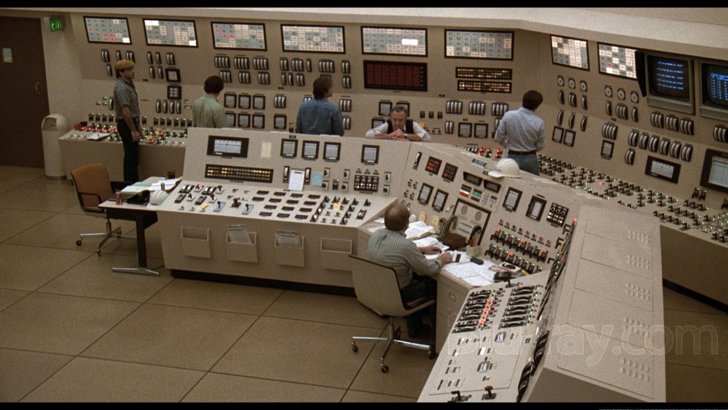
There are two standard audio tracks on this Blu-ray release: English LPCM 1.0 and English DTS-HD Master Audio 5.1. Optional English SDH subtitles are provided for the main feature.
I viewed the entire film with the LPCM 1.0 track and thought that it was excellent. It has good depth, proper clarity, and plenty of nuanced dynamics. Balance is excellent as well, and I never felt that there was unevenness or 'thinning' in the high register(s). Background anomalies, such as hiss and hum, have been thoroughly eliminated as well.
The China Syndrome Blu-ray Movie, Special Features and Extras 

- Trailer - an original U.S. trailer for The China Syndrome. In English, not subtitled. (2 min).
- Deleted Scenes - three deleted scenes. In English, not subtitled. (4 min).
- Creating a Controversy - this archival featurette focuses on the production history and style of The China Syndrome. Included in it are clips from vintage interviews with Michael Douglas, Jane Fonda, James Karen, Peter Donat, executive producer Bruce Gilbert, and Jack Larson (partner of writer/director James Bridges), amongst others. In English, not subtitled. (30 min).
- A Fusion of Talent - in this archival featurette, Michael Douglas explains what inspired him to become involved with The China Syndrome and become its producer and discusses the evolution of its production. Jane Fonda also recalls the preparation work she did for her character and discusses the film's style. There are additional comments about the shooting process as well. In English, not subtitled. (28 min).
- Assessing the Fallout - in this new video piece, prof. Tony Shaw discusses the conception of The China Syndrome and some of the less obvious political overtones in it. The piece was produced for Indicator/Powerhouse Films in 2018. In English, not subtitled. (18 min).
- Image Gallery - a gallery of vintage promotional materials for The China Syndrome.
- The John Player Lecture with Jack Lemmon - in this archival Q&A session, Jack Lemmon discusses at length his acting career, the directors that had an impact on his work, what it was like to work in Hollywood, his fondness of characters that are are best described as losers, the genesis of his only directorial effort Kotch and his work with Walter Matthau on The Odd Couple, etc. The session, which is moderated by Philip Oakes, was recorded at the National Film Theatre in London in 1973. In English, not subtitled. (80 min).
- Booklet - a limited edition exclusive booklet with a new essay by Neil Sinyard, an overview of contemporary critical responses and historic articles on the film.
The China Syndrome Blu-ray Movie, Overall Score and Recommendation 
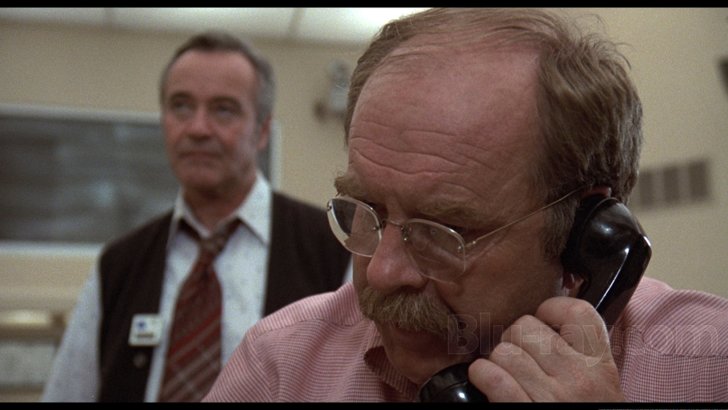
Throughout my life, I have always maintained that nuclear power plants are a lot like giant ticking bombs because there are too many external factors that can quickly and irreversibly disable their safeguarding models. Even after the Chernobyl disaster and seemingly endless technological improvements, I still believe that the risks remain the same. If the opposite was true, the recent Fukushima tragedy would not have occurred. The China Syndrome was the first mainstream film to seriously question whether engineers can actually fully control the technology that delivers nuclear energy, and because of this I consider it an important film. However, I also think that without the typical Hollywood cliches clogging up its second half, it could have been a vastly superior film. Indicator/Powerhouse Films' new release of The China Syndrome is sourced from a remaster that Sony Pictures produced in the United States some years ago, but it has new bonus features that are not found on Image Entertainment's Blu-ray release of the film. RECOMMENDED.
Similar titles
Similar titles you might also like

All My Sons
Indicator Series | Limited Edition
1948

The Big Heat
Indicator Series
1953

Money Monster
2016

Hidden Agenda
1990

Hell Drivers
1957

Electra Glide in Blue
1973

Witness 4K
Limited Edition
1985

Boomerang!
Masters of Cinema
1947

Each Dawn I Die
Warner Archive Collection
1939

Fearless
Warner Archive Collection
1993

Vanishing Point
2 Disc Edition
1971

Prince of the City
Warner Archive Collection
1981

Duel 4K
TV version in HD
1971

The Glass Key
Arrow Academy
1942

The Big Combo
Arrow Academy
1955

Walk East on Beacon!
Indicator Series | Standard Edition
1952

Black Widow
1987

Gray Lady Down
Indicator Series
1978

Thieves' Highway
Arrow Academy
1949

Dead Reckoning
Indicator Series | Standard Edition
1947
